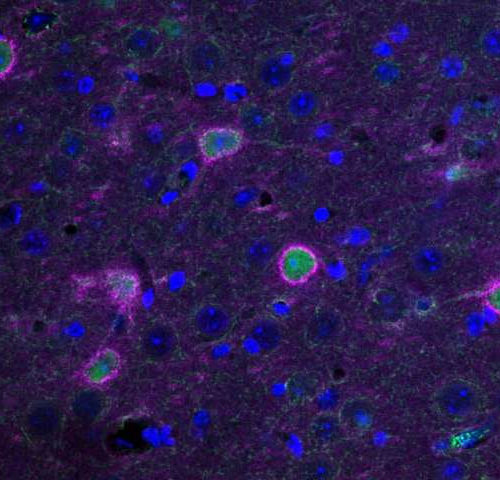by Luciana Constantino, FAPESP Credit: Pixabay/CC0 Public Domain Using sequencing techniques, researchers associated 51 mutations in mitochondrial DNA with amyotrophic lateral sclerosis (ALS), an incurable degenerative neurological disorder that leads to muscle atrophy and paralysis. Thirteen of the mutations increased the risk of ALS, while 38 were protective. The study suggests these mutations may be important...
Tag: <span>amyotrophic lateral sclerosis (ALS)</span>
Toxic protein may contribute to amyotrophic lateral sclerosis development
Credit: Structure (2024). DOI: 10.1016/j.str.2024.08.002 A toxic version of a certain protein may affect brain, spinal cord and skeletal muscle tissues differently, leading to the complex development and progression of amyotrophic lateral sclerosis (ALS), according to a new study by a team of researchers from Penn State College of Medicine. The study represents a step forward in...
New insights from first clinical trial of potential treatment for motor neurone disease
by Rebecca Ferguson, University of Sheffield Results from a randomized clinical trial have shown that a potential new treatment can help control the immune response of patients with motor neuron disease (MND), which could reduce further damage in the brain and spinal cord. MND is the name for a group of diseases which affects the...
Researchers delay onset of amyotrophic lateral sclerosis (ALS) in laboratory models
A team of researchers led by scientists at the University of Toronto (U of T) has delayed the onset of amyotrophic lateral sclerosis (ALS) in mice. They are cautiously optimistic that the result, combined with other clinical advances, points to a potential treatment for ALS in humans. Commonly known as Lou Gehrig’s disease, ALS is...
Researchers Show How Lou Gehrig’s Disease Progression Could Be Delayed
UC Riverside-led study could lead to development of small molecule drugs to treat also spinal cord injury, Alzheimer’s disease, and some cancers Amyotrophic lateral sclerosis or ALS is sometimes known as Lou Gehrig’s disease, named after the Yankees baseball player renowned for his prowess as a hitter and for his durability — a trait that...
Better understanding ALS by looking at how cells change
It took eight long years of research, but now an international team led by neuroscientists at Université de Montréal has discovered a basic molecular mechanism that better helps understand how Lou Gehrig’s disease, or amyotrophic lateral sclerosis (ALS), works. And that basic science could someday lead to new therapy for the debilitating disease, which cripples...
Discovery of a promising medication for amyotrophic lateral sclerosis
Researchers from the University of Montréal Hospital Research Centre (CRCHUM) and the Cumming School of Medicine (CSM) at the University of Calgary have discovered a medication that could make it possible to treat individuals with amyotrophic lateral sclerosis (ALS), or Lou Gehrig’s disease. An article published today in JCI Insight concludes that pimozide was found to be...
Body’s own defense against ALS actually drives disease progression at later stages
Differences in disease progression in spinal interneurons, a type of nerve cell that generally succumbs to ALS in later stages of disease. Left: Normal ALS models, showing protein aggregation (red/green) in spinal interneurons.Right Columbia scientists have discovered that one of the body’s natural defenses against amyotrophic lateral sclerosis (ALS)—a cellular ‘clean-up process’ called autophagy—suppresses...
FIRST FDA-APPROVED TREATMENT FOR ALS IN 22 YEARS NOW AVAILABLE IN U.S.
JERSEY CITY, N.J., Aug. 8, 2017 – Mitsubishi Tanabe Pharma America, Inc., today announced RADICAVA ™ (edaravone), an intravenous therapy indicated for all adult patients diagnosed with amyotrophic lateral sclerosis (ALS), also known as Lou Gehrig’s disease, is now available for treatment in the United States. RADICAVA, the first FDA-approved ALS treatment option in more than 20 years,...
Creating music by thought alone
Neurologists have created a hands-free, thought-controlled musical instrument, which they’ve recently described in a report in Frontiers in Human Neuroscience. Researchers hope that this new instrument will help empower and rehabilitate patients with motor disabilities such as those from stroke, spinal cord injury, amputation, or amyotrophic lateral sclerosis (ALS). “The Encephalophone is a musical instrument that you control...
- 1
- 2


